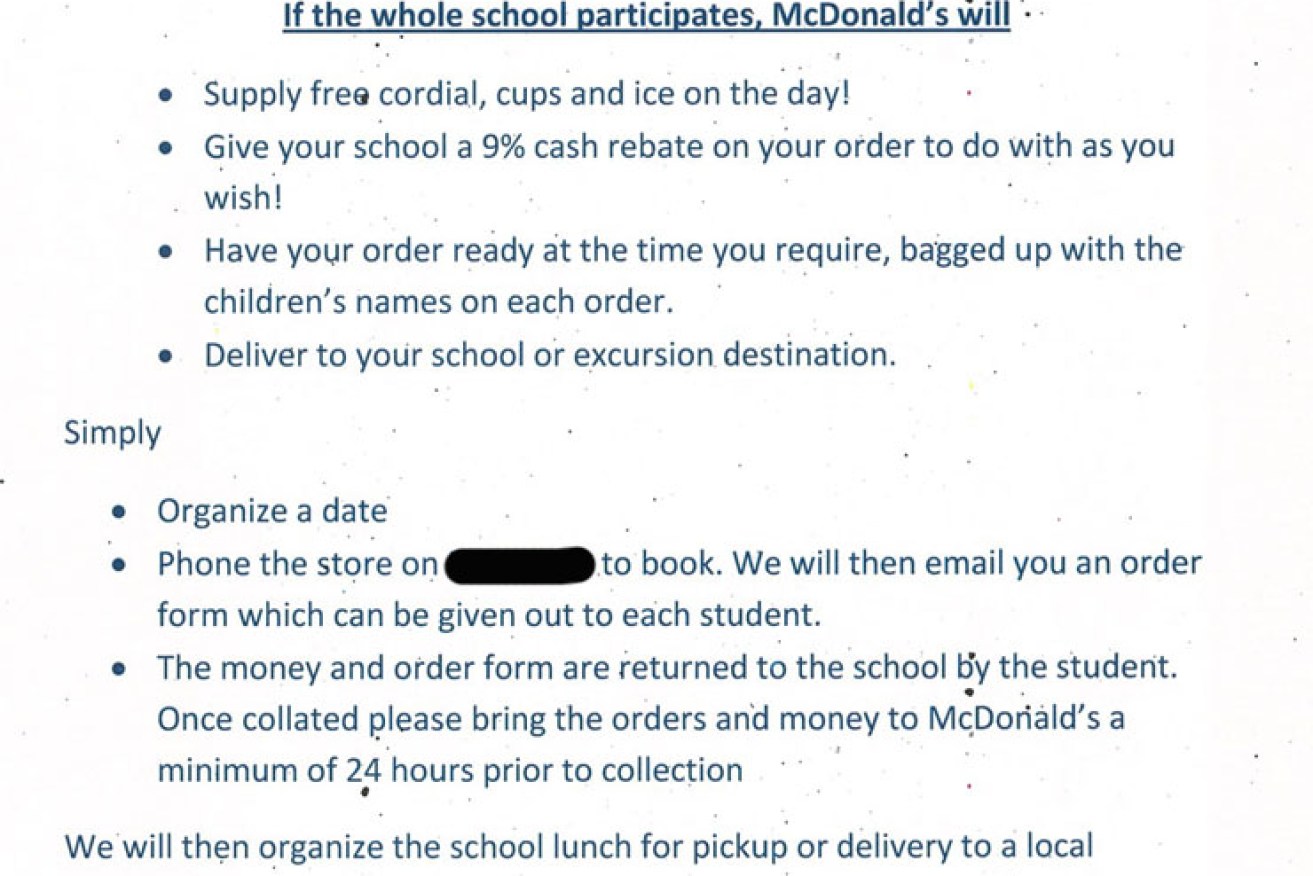A McDonald’s franchise has been slammed as ‘exploitative’ for offering cash in return for student lunch orders.
In January, a Mildura outlet in northern Victoria said it would give back money to administrators if their “whole school” ordered a fast food meal.
“[We will] give your school a nine per cent cash rebate on your order to do with as you wish!” said the letter.
• Alcohol benefits may be ‘harmful propaganda’
• John Oliver praises Australia’s anti-smoking laws
• Big beer ‘craftily’ squeezing out Aussie brewers

Cricket fans dressed as Ronald McDonald cheer at a sports match, where fast food advertising dominates.
But the offer, which promised that each order would be “bagged up with the children’s names” on the front, has been criticised by health groups as the latest tactic by a junk food giant trying to hook young people on its food.
“From McDonalds’ perspective, this is not about selling junk food once a term,” said Dimity Gannon, campaign manager with families group The Parents’ Jury, which raised the alarm in Mildura.
“This is about marketing and trying to build these children up as consumers for a lifetime.”
Her views echo those of the World Health Organisation (WHO), which has told all governments to shield places like such as schools and sports organisations from junk food advertising. Many nations, including the UK, have begun to follow the advice.
The Australian market, however, remains largely self-regulated, which one group described as “putting the fox in charge of the hen house”.
A McDonald’s spokesman told The New Daily that its stores do not communicate with schools in any way unless requested or agreed to by the school administration, but noted that the letter (see below) was “unusual” and not sent from the company’s head office.
McDonald’s currently sponsors Little Athletics and Hoop Time Basketball. KFC blankets cricket in branding, while Coca Cola supports cycling and various other sporting clubs.
McDonald’s also recently announced a four-year partnership with the Australian Football League, which gave it naming rights over AFL 9s, a new form of the game.
The initial backlash in Mildura was led by The Parents’ Jury, which has called for a national ban on junk food promotions to children.
“This is definitely not just about McDonalds either,” she said.
“Anything that a school is endorsing really normalises those foods for children. It tells kids that it’s okay to eat these foods every day.”
Andrea Sloane, manager of the Healthy Together Mildura initiative, agreed that any fast food marketing aimed at “vulnerable” children was unacceptable.

Australia captain George Bailey holds aloft a KFC Twenty20 trophy – a form of the game popular with families. Photo: AAP
“School curriculum promotes healthy eating and good health and schools need to uphold those values and actually provide that type of food within the school environment,” Ms Sloane said.
The McDonald’s spokesman did not deny that the company communicates directly to children, but said “we only promote healthier options” when doing so.
“For more than 40 years McDonald’s and our licensees have supported local community organisations and sports clubs responsibly. We see no reason to discontinue that support,” said McDonald’s spokesman Chris Grant.
“A lot of schools order in a pizza or some other fast food for fundraisers or other events, and I don’t see how McDonald’s is any different to that,” he added.
The Obesity Policy Coalition executive manager Jane Martin said junk food advertising in schools and sport was a “very, very powerful vehicle” designed to make children think that unhealthy foods should be eaten regularly.
“As a parent, I’ve seen the influence of this kind of thing when my child plays Hoop Time Basketball. They won. She got a McDonald’s t-shirt and then the whole team went to McDonald’s and I couldn’t say no,” Ms Martin said.
“It’s insidious and it’s exploiting children’s inability to understand the intent of the marketing.
“Schools should be a safe and healthy place for kids, and so should childcare centres and so should sport.”











